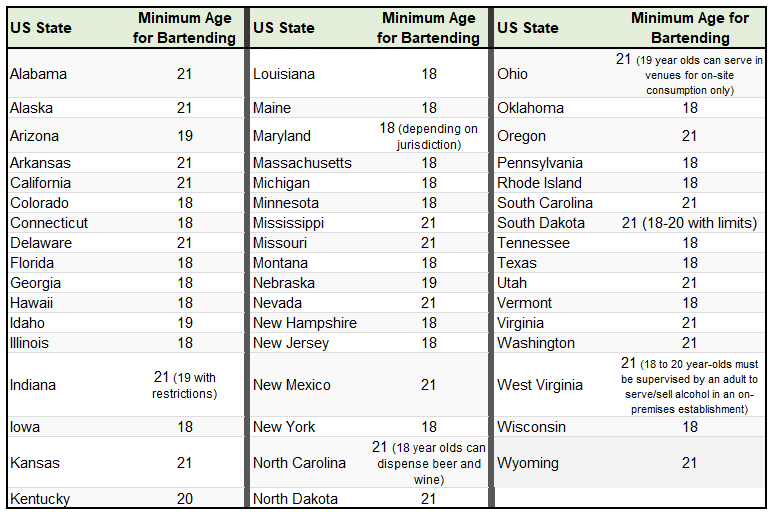Introduction: Embarking on the Journey to Cocktail Mastery
In the bustling nightlife of Illinois, bartenders are the unsung heroes who elevate each libation into a symphony of flavors. They blend artistry and expertise, transforming ordinary ingredients into extraordinary sensory experiences. If the allure of mixology has ignited a passion within you, whether as a budding entrepreneur or a curious enthusiast, obtaining a bartending license in Illinois is the pivotal first step to unlocking this rewarding world. This comprehensive guide will navigate you through the essential steps, empowering you with both the knowledge and tools to embark on this fulfilling journey.

Image: servingalcohol.com
Step 1: Meeting the Age and Certification Requirements
In Illinois, aspiring bartenders must meet specific age and certification requirements to obtain a license. Firstly, you must be at least 21 years of age, as this aligns with the state’s legal drinking age. Additionally, you are required to complete an Illinois-approved responsible serving of alcohol (RSA) training program. These programs typically cover topics such as underage drinking prevention, blood alcohol concentration (BAC) estimation, and how to identify and respond to intoxicated顾客s.
Step 2: Choosing a Bartending School or Course
While not mandatory, enrolling in a reputable bartending school or course can significantly enhance your skills and prepare you for the licensing exam. These programs typically provide hands-on training, allowing you to practice your techniques under the guidance of experienced bartenders. When selecting a school or course, consider factors such as curriculum, instructor qualifications, and industry reputation.
Step 3: Applying for a Bartending License
Once you have completed the RSA training and any optional bartending courses, you can apply for a bartending license through the Illinois Liquor Control Commission (ILCC). The application process involves submitting a completed application form, paying the required fees, and providing proof of your RSA certification. The ILCC will review your application and conduct a background check to ensure you meet the eligibility criteria.

Image: makedailyprofit.com
Step 4: Preparing for and Passing the Bartending Exam
To obtain your bartending license, you must successfully pass the written bartending exam administered by the ILCC. The exam covers various aspects of responsible alcohol service, including:
- Illinois liquor laws and regulations
- Types of alcoholic beverages and their effects
- Measuring and mixing drinks
- Identifying signs of intoxication
- Techniques for preventing underage drinking
Thorough preparation is crucial for exam success. Study the exam materials diligently, practice answering relevant questions, and consider using practice tests to assess your readiness.
Step 5: Maintaining Your License and Continuing Education
Once you have obtained your bartending license, you are required to renew it every two years. To renew your license, you must complete a renewal application and pay the required fees. Additionally, Illinois bartenders are obligated to complete six hours of continuing education every renewal period. These educational opportunities help you stay abreast of industry trends and best practices, ensuring you provide the highest level of service.
Beyond the License: Building Your Craft
Obtaining a bartending license opens doors to numerous opportunities within the vibrant Illinois hospitality industry. However, it is just the foundation upon which you can build a fulfilling career or nurture a passion for mixology. Consider the following tips to elevate your skills and knowledge:
-
Practice regularly: The art of bartending requires constant practice. Experiment with different recipes, ingredients, and techniques to refine your craft and develop your own unique style.
-
Engage in continuing education: Participate in workshops, seminars, and online courses to expand your knowledge of spirits, cocktails, and industry trends.
-
Compete in bartending competitions: Challenges and competitions provide valuable opportunities to showcase your skills, receive feedback, and connect with fellow bartenders.
-
Stay informed about industry news: Read industry publications and attend trade shows to stay abreast of the latest trends, innovations, and advancements in the world of bartending.
How To Become A Bartender In Illinois
Conclusion: Unleashing Your Inner Mixologist
Becoming a licensed bartender in Illinois empowers you to embark on a rewarding and exciting journey that fuses creativity, hospitality, and a genuine passion for serving others. Whether you aspire to craft memorable cocktails behind the bar or simply want to impress your friends with your mixology prowess, obtaining your license unlocks a world of possibilities. By following the steps outlined in this guide and cultivating your skills through practice and continuous learning, you will not only become a licensed bartender but also an ambassador of responsible and exceptional hospitality in Illinois.